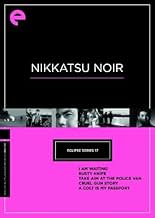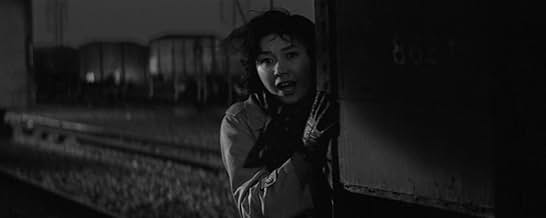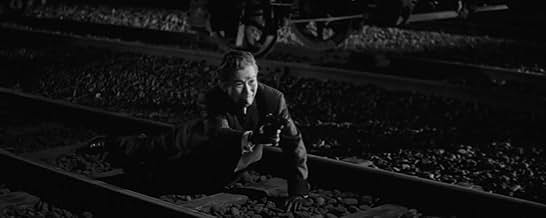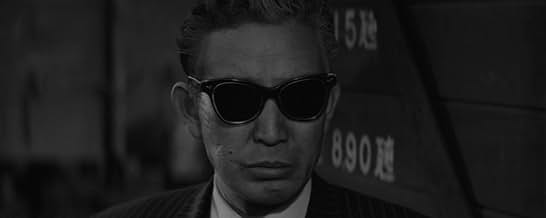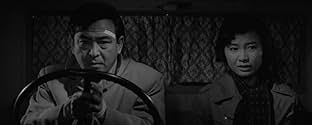Take Aim at the Police Van
Original title: 'Jûsangô taihisen' yori: Sono gosôsha o nerae
IMDb RATING
6.6/10
1.5K
YOUR RATING
A prison truck is assaulted and the two convicts inside are murdered. The prison guard on duty gets suspended for negligence and takes it upon himself to track down the killers.A prison truck is assaulted and the two convicts inside are murdered. The prison guard on duty gets suspended for negligence and takes it upon himself to track down the killers.A prison truck is assaulted and the two convicts inside are murdered. The prison guard on duty gets suspended for negligence and takes it upon himself to track down the killers.
- Director
- Writers
- Stars
- Director
- Writers
- All cast & crew
- Production, box office & more at IMDbPro
Featured reviews
Film 3/5 in the Nikkatsu Noir boxset I'm working through, and I'd rank this behind Rusty Knife (film 2/5), but ahead of I Am Waiting (film 1/5).
I'll give it this: Take Aim at the Police Van has a great title and a great opening- both work well to get you hooked early to the simple premise (prison guard is partially blamed for deaths that weren't his fault, so he goes looking for the real killers himself) that soon balloons out and gets very complicated.
While some of the complexity and mystery is intentional, given the main character doesn't really know what's going on much of the time, I think it may have left the audience in the dark just a little too much. You could say that about a lot of classic noir, though- I think it's The Maltese Falcon where the writer even admitted he didn't really understand 100% of the plot.
(EDIT: legend actually goes that it was The Big Sleep where the screenwriters were confused by what they were writing. Do remember Maltese Falcon also having a confusing plot, for what it's worth)
But in any event, it stays entertaining because of the fast (if almost a little too quick) pace, the stylish direction, and some exciting sequences. Plus the mystery is a pretty decent one.
It all makes for an overall solid watch.
I'll give it this: Take Aim at the Police Van has a great title and a great opening- both work well to get you hooked early to the simple premise (prison guard is partially blamed for deaths that weren't his fault, so he goes looking for the real killers himself) that soon balloons out and gets very complicated.
While some of the complexity and mystery is intentional, given the main character doesn't really know what's going on much of the time, I think it may have left the audience in the dark just a little too much. You could say that about a lot of classic noir, though- I think it's The Maltese Falcon where the writer even admitted he didn't really understand 100% of the plot.
(EDIT: legend actually goes that it was The Big Sleep where the screenwriters were confused by what they were writing. Do remember Maltese Falcon also having a confusing plot, for what it's worth)
But in any event, it stays entertaining because of the fast (if almost a little too quick) pace, the stylish direction, and some exciting sequences. Plus the mystery is a pretty decent one.
It all makes for an overall solid watch.
A 1960 police actioner from writer/director Seijin Suzuki (Branded to Kill/Tokyo Drifter) about a disgraced prison guard, Michitaro Mizushima, who loses some of his charges during a shootout during a nighttime transfer. Taking the law into his own hands but also at some point in the story cops are brought in, Mizushima tracks down the players behind the act siding up to the moll of one of the crooks in the hopes of getting back some dignity he suffered from the escape. As per Noir Alley's host Eddie Muller, the film was a revelation to Japanese audiences, especially the younger sect, which embraced the film embarrassing the honchos at the film studio but now 64 years after the fact the film is fine but ultimately safe when a lot of the gunfights which may've lit a fire under the viewing public butts now feel like so much uncontrolled chaos but the throughline of the plot is solid enough though.
This is one violent (not in gore as it is brute force intensity), gritty film-noir (part of the "Nikkatsu Noir" set from Eclipse/Criterion) that has a helluva hook - a prison van carrying a couple of peeps is driving at night and two criminals knock a truck in its path to stop the van and then shoot to kill. In the aftermath, one of the guards, Tamon (Mizushima, strapping and no BS male star for Japan if I ever saw one, a bit like a Japanese Mitchum or Glenn Ford), takes it on himself to investigate who was behind it, and it leads him into an 'Agency' that pimps out young women among other nefarious crimes (and what does Tsunaka Ando, played by Shiraki, have to do with it all, or does she even know?)
What makes Seizuki's direction so palpable and involving is how he manages to find some stylistic flourishes while keeping this tight 79 minute story moving; there's this one superbly edited bit where Tamon is walking down a street and Seizuki cuts from him and his grim-determined profile and these four young ladies singing along to a pop song on a jukebox. You think he's recognized the young woman he's been after, he followed her and lost her in a previous scene (those darn graveyards will get ya), but it's not till just a slight beat after he goes by her that he does a double take and recognizes her (and her him) and as he lunges for her she gives a look and the other girls pounce on him. It's extremely clever direction placing us in suspense we aren't even sure will come about, and then it ends on a tussle that is more funny than thrilling (and that's good sometimes!)
Take Aim at the Police Van (one of my favorite titles of all time for the record) doesn't have the most original supporting characters, mostly low life thugs and pissants who may only best Tamon because they're a step ahead of him, and even Shiraki is mostly there to get tense when questioned and then fold pretty quickly thereafter. But the mystery is drawn out without any extra fat on the spine, when characters (mostly Tamon but eventually some others in his orbit) are in danger and are either trapped or fending for their lives it feels like anything can happen, and Seizuki understands widescreen can be used formidably for creating spaces and tension and also for an impactful, once or twice nearly iconic close up (like the sunglasses when we get to see them on the man).
Maybe it is "minor" when compared to Branded to Kill, but that's a tall bar to clear and this is perfectly entertaining B moviemaking all on its own - with an ironic twist ending, but one that means to end more on a surprising emotional beat than a simple "gotcha.
What makes Seizuki's direction so palpable and involving is how he manages to find some stylistic flourishes while keeping this tight 79 minute story moving; there's this one superbly edited bit where Tamon is walking down a street and Seizuki cuts from him and his grim-determined profile and these four young ladies singing along to a pop song on a jukebox. You think he's recognized the young woman he's been after, he followed her and lost her in a previous scene (those darn graveyards will get ya), but it's not till just a slight beat after he goes by her that he does a double take and recognizes her (and her him) and as he lunges for her she gives a look and the other girls pounce on him. It's extremely clever direction placing us in suspense we aren't even sure will come about, and then it ends on a tussle that is more funny than thrilling (and that's good sometimes!)
Take Aim at the Police Van (one of my favorite titles of all time for the record) doesn't have the most original supporting characters, mostly low life thugs and pissants who may only best Tamon because they're a step ahead of him, and even Shiraki is mostly there to get tense when questioned and then fold pretty quickly thereafter. But the mystery is drawn out without any extra fat on the spine, when characters (mostly Tamon but eventually some others in his orbit) are in danger and are either trapped or fending for their lives it feels like anything can happen, and Seizuki understands widescreen can be used formidably for creating spaces and tension and also for an impactful, once or twice nearly iconic close up (like the sunglasses when we get to see them on the man).
Maybe it is "minor" when compared to Branded to Kill, but that's a tall bar to clear and this is perfectly entertaining B moviemaking all on its own - with an ironic twist ending, but one that means to end more on a surprising emotional beat than a simple "gotcha.
Take Aim at the Police Van, originally known as Jûsangô taihisen' yori: Sono gosôsha o nerae, is a Japanese film noir that unfolds as an investigative thriller through seventy-nine minutes. The movie was made by renowned director Seijun Suzuki who had become a regular choice for Nikkatsu Studios by the early sixties before experimenting wildly with visual effects and being kicked out in 1967. Mizushima Michitaro incarnates the film's sincere protagonist and his grounded depiction provides much depth to the film while his acting experience of thirty-five years makes for a charismatic screen presence throughout. He is paired up with rising star Watanabe Misako who shines as charismatic feminist with remarkable courage, smart decisions and dedicated independence.
In this particular film, Mizushima Michitaro plays a guard who is supposed to bring a group of prisoners to a new location in the middle of the night. The van gets ambushed and two prisoners are brutally murdered. The guard is suspended for six months and decides to investigate the motive behind those assassinations. He starts by observing a third prisoner who survived the ordeal who seems to have ties to a shady call girl agency. Said agency is led by an enigmatic young woman whose father is in jail. She starts investigating the mysterious case as well as she believes a mysterious concurrent called Akiba might be the mastermind behind the crimes. The disgraced guard and the ambitious businesswoman team up in order to make justice prevail despite opposition from arrogant police officers and nagging business partners alike.
This film noir convinces on several levels. The movie oozes with sinister atmosphere thanks to excellent lighting techniques, gloomy camera work and appropriate settings on isolated roads in the middle of the night or in decaying industrial areas on the outskirts of rapidly developing towns. The acting performances are great as Mizushima Michitaro convinces as unusually old lead actor while Watanabe Misako is ahead of her time by portraying a strong feminist femme fatale. The film's finale is particularly intense and will leave a lasting emotional impression upon genre fans, thus bringing the movie full circle as it reconnects to its gripping overture.
However, this film is also weaker than many other Japanese films noirs that saw the light of day in the late fifties and early sixties. Despite its short running time, the movie has noticeable lengths and especially its middle section drags on for far too long. The script is thin and takes much time to unfold between the intense opening ten minutes and the conciliatory final ten minutes. The film's side characters remain shallow and the supporting actors and actresses aren't given any chance to showcase their talents significantly.
At the end of the day, the coolest thing about Take Aim at the Police Van, originally known as Jûsangô taihisen' yori: Sono gosôsha o nerae, might actually be its catchy title. Its gloomy atmosphere, excellent lead actress and lead actor as well as its gripping opening and closing scene keep this film from drowning in mediocrity. The middle section's exhausting lengths, weak script and shallow side characters incarnated by a cast that fails to stand out reduce this movie to a film noir that only just qualifies as good average movie that tends to be slightly overrated in hindsight. My sincere recommendation is to watch several other Japanese genre films of the same era instead while this particular film here is only of interest for adamant fans of the lead actor, the lead actress and the controversial director in particular.
In this particular film, Mizushima Michitaro plays a guard who is supposed to bring a group of prisoners to a new location in the middle of the night. The van gets ambushed and two prisoners are brutally murdered. The guard is suspended for six months and decides to investigate the motive behind those assassinations. He starts by observing a third prisoner who survived the ordeal who seems to have ties to a shady call girl agency. Said agency is led by an enigmatic young woman whose father is in jail. She starts investigating the mysterious case as well as she believes a mysterious concurrent called Akiba might be the mastermind behind the crimes. The disgraced guard and the ambitious businesswoman team up in order to make justice prevail despite opposition from arrogant police officers and nagging business partners alike.
This film noir convinces on several levels. The movie oozes with sinister atmosphere thanks to excellent lighting techniques, gloomy camera work and appropriate settings on isolated roads in the middle of the night or in decaying industrial areas on the outskirts of rapidly developing towns. The acting performances are great as Mizushima Michitaro convinces as unusually old lead actor while Watanabe Misako is ahead of her time by portraying a strong feminist femme fatale. The film's finale is particularly intense and will leave a lasting emotional impression upon genre fans, thus bringing the movie full circle as it reconnects to its gripping overture.
However, this film is also weaker than many other Japanese films noirs that saw the light of day in the late fifties and early sixties. Despite its short running time, the movie has noticeable lengths and especially its middle section drags on for far too long. The script is thin and takes much time to unfold between the intense opening ten minutes and the conciliatory final ten minutes. The film's side characters remain shallow and the supporting actors and actresses aren't given any chance to showcase their talents significantly.
At the end of the day, the coolest thing about Take Aim at the Police Van, originally known as Jûsangô taihisen' yori: Sono gosôsha o nerae, might actually be its catchy title. Its gloomy atmosphere, excellent lead actress and lead actor as well as its gripping opening and closing scene keep this film from drowning in mediocrity. The middle section's exhausting lengths, weak script and shallow side characters incarnated by a cast that fails to stand out reduce this movie to a film noir that only just qualifies as good average movie that tends to be slightly overrated in hindsight. My sincere recommendation is to watch several other Japanese genre films of the same era instead while this particular film here is only of interest for adamant fans of the lead actor, the lead actress and the controversial director in particular.
This film begins with a bus carrying two convicts to prison being ambushed by a man with a rifle which results in both of the prisoners being killed. Outraged about this incident, the authorities quickly suspend the prison guard responsible for the prisoner transport by the name of "Daijiro Tamon" (Michitaro Mizushima). So, with nothing but time on his hands, Daijiro goes about investigating the ambush and what clues he finds eventually leads him to a company known as the Hamaju Agency which is being temporarily run by a young woman by the name of "Yuko Hamajima" (Misako Watanabe). What he doesn't realize, however, is that the closer his investigation gets to the culprit behind the murders, the more dangerous it becomes for him. Now, rather than reveal any more, I will just say that this turned out to be a decent film due in large part to the mystery involved along with some good suspense here and there as well. Admittedly, there are some parts of the plot that are a bit unrealistic, but even so, I enjoyed this movie for the most part and I have rated it accordingly. Slightly above average.
Did you know
- TriviaA trail of gasoline poured on the ground as depicted here, would burn at only about three miles per hour, or about the pace of a brisk walk. This velocity was tested on Trail Blazers (2007).
- GoofsIn the opening scenes, the prisoner's handcuffs are so loose that he could easily slip his hand through.
- ConnectionsFeatured in Best in Action: 1960 (2018)
Details
- Release date
- Country of origin
- Language
- Also known as
- Aim at the Police Van
- Production company
- See more company credits at IMDbPro
- Runtime
- 1h 19m(79 min)
- Color
- Aspect ratio
- 2.35 : 1
Contribute to this page
Suggest an edit or add missing content

